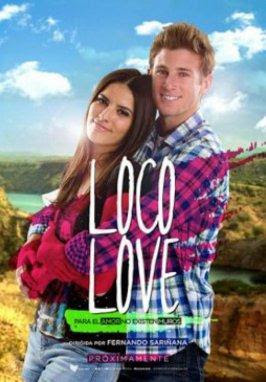Film Review: "Loco Love"
 |
| Loco Love (2013) |
Loco Love, co-directed by Jose Luis Gutierrez Arias and Fernando Sariñana, is set in modern day Arizona and deals with a Mexican teen, Marisol (portrayed by Melany Bennett), and an American teen, Gavin (Evan Deverian), falling for each other and dating amidst the social pressures and racial tensions coming from both their families against each other.
Though in theory the plot of this film sounded interesting - taking an apparent inspiration from Stephen Sondheim's "West Side Story", except set in contemporary time, and exploring how an interracial relationship could cope (if), in a town full of racial tension and prejudice from both racial sides involved - but unfortunately this film and its exploration of its themes and messages of racial tolerance and inclusivity failed in execution, starting with the characters who are supposed to carry the plot and help us connect.
While Melany Bennett's interpretation of the protagonist, Marisol, is fine and I had no problem with, it is her co-star Evan Deverian's character and Marisol's love interest, Gavin, that I found rather troubling. Though Deverian's characterization of Gavin and Gavin's dialogue succeeded at convincing viewers that Gavin was against the racial hate surrounding his relationship with Marisol and helped stand as a figure in the middle of the racial-based hate seen in the movie, it was his unrealistic infatuation with Marisol's character (and the high levels of such infatuation), that I found troubling, badly acted, and frankly found myself saying "Oh, come on!" about fifteen times throughout the film.
Marisol and Gavin first meet a carnival-like park, where Gavin sees Marisol riding the carousel with her best friend, and magically becomes deeply infatuated with her - and when Marisol sees him, she does too with him. While I have no problem with the concept of "love at first sight," it is the high level of unrealistic infatuation that carries on throughout the film that doesn't correspond for the flat relationship that is exhibited in the film. Gavin claimed to be in love with Marisol not long upon meeting her, yet he didn't know her name, where she worked, or anything more about her including her interests and character for which he could profess genuine feelings about her. This unnatural and unrealistic characterization of Gavin's infatuation toward Marisol (and their flat relationship that unfolds and is attempted to be characterized as deep) in turn doesn't come out as genuine to viewers like myself, and makes it hard to believe in this story, even more so given the fact that the development of Marisol's and Gavin's relationship isn't organic and rather awkwardly forced in, making their relationship not be compelling or worth rotting for as in other well-crafted films.
Although it is understandable that the exploration of both racial and social tension that is caused by racially fueled hate and prejudice would involve exposing viewers to see American and Mexican characters alike being involved in racist banter and for race-related issues to be discussed and central to the story, the exploration employed in Loco Love - particularly the exaggerated tone and characterization of most of its cast - fails for it, and ultimately the film, to be taken seriously.
With the exception of Gavin, every American character is portrayed as being overtly racist against Mexicans, while with the exception of Marisol, every Mexican character is portrayed as being overtly racist to Americans, which isn't realistic even in today's social climate and just a big headache. Yes, unfortunately overtly racist people do exist, but not every American or Mexican is nor does every American or Mexican character have to be portrayed that way.
This flat portrayal of racist American and Mexican characters was frustrating for various reasons, starting with the fact that the film was constructed in a way that was rooting more for the Mexican characters and portraying them to be the good characters and only victims of racial hatred, even though they themselves took part in racist behavior. Not only did Marisol's family constantly tell Marisol that she shouldn't "mix" with people of a different skin color, but Marisol's little brother kept constantly name calling Americans throughout the film, which was honestly a headache.
Additionally, the film's flat portrayal and characterization of its supporting American and Mexican characters was troubling for the fact that its characters could have offered so much more. These actually diverse characters had the capability of having a complex personality and thought, character development, and offer genuine, more meaningful commentary and insight on the race issue, but by choosing to make these characters the same way (the same racist character type, just a different name and face), the supporting Mexican and American characters around Marisol and Gavin became flat and not memorable, failing at their supposed supporting duty.
Although it is understandable that the strong, racially fueled tension these flat supporting American and Mexican characters helped create was likely aimed to reflect some of the real, strong tension that some interracial relationships have experienced and continue to experience, characterizing the majority of American characters (except for Gavin) and Mexican characters (except for Marisol) and generalizing them all under the same racist mold can also be very harmful.
Not only does characterizing all of the characters of a particular race or ethnic group (or any type of group for that matter) with the same general traits, behavior, and in this case racist mold may feel implied that all people of this actually diverse group are believed to be this way and generalized as so solely because of their race, but creating such a careless flat characterization of its characters also leaves little room for character development or growth in the movie, destroying any hope of impact and real, meaningful conversation about race, racial issues, and the need of tolerance of cultural differences from taking place outside the movie theater.
Another element that I found exhausting was the constant mentioning of race in the film, in literally almost every scene, in any way possible even if completely unrelated to the topic and action of the scene. After half an hour of watching the film whenever a scene started I wondered how the characters would somehow insert the topic of race in whatever they were doing (for instance, if there was a scene in which an American character was washing their hands, I would imagine the American character would say, "This soap is bad - just like foreigners!!") Again, I completely understand that race and race-related issues are at the heart of this drama film, and for such race-related topics will likely be mentioned often and throughout the film, but constantly bringing up the serious topic of race when it is not needed, isn't relevant to the action of the scene, isn't organically incorporated, and in almost every scene of the film is exhausting and takes away from the serious topic that should be delicately and seriously treated in within the film.
But not all is bad with this film, because Bennett delivered an acceptable voice for Marisol and Deverian's Gavin helped served as a balance and figure standing in between the racial hatred that unfolded in what was a good intended plot that just wasn't executed well. Though the execution of Loco Love wasn't the best and at many times cringe-worthy, which was strongly due to the exaggerated characterization and dialogue of many of its characters (I'm looking particularly at Luke, Ramón and Gavin's father), I will commend the film for attempting to discuss a topic that doesn't get discussed often in mainstream film and that is difficult to talk (properly) about, and that is the impact of racial tensions - specifically Mexican-American relations, even more so on a contemporary, multicultural society - and the much important need for tolerance.
While Loco Love isn't truly and fully reflective of the majority of contemporary United States and most of its cast isn't memorable, the film does raise an important, but imperfect, voice and commentary on the still existence of racial-based tension and prejudice - even in progressive and multicultural societies like the United States today and especially in progressive and multicultural societies like the United States today.
Final word:
It is for this, that I ultimately conclude to rate this film 1.5 of 4 stars, or 3.75/10.
Though the film had potential in its plot and intentions of exploring socio-cultural and racial issues, Loco Love ultimately failed at delivering a more polished product without having to heavily rely on overt exaggerations of both Mexican and American characters alike - weakening the film's message about inclusivity and tolerance.

Comments
Post a Comment